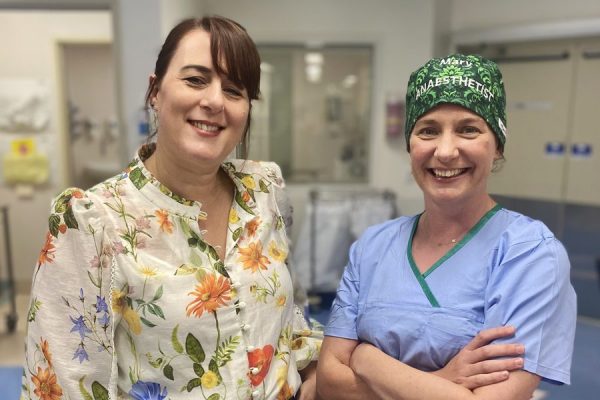TPCH anaesthetists make a clinical sustainable switch for a greener future

Kellie and Mary are behind the new green initiative at TPCH.
The Prince Charles Hospital (TPCH) is Queensland’s first hospital, and the first large tertiary hospital in Australia, to decommission its use of reticulated nitrous oxide anaesthetic gas to reduce potent greenhouse gas emissions that leak from piped infrastructure.
Leading this clinical sustainability initiative, TPCH anaesthetist Dr Mary O’Shea teamed up with Green Metro North to ‘switch off’ the reticulated systems and seal the valves.
Dr O’Shea said this seemingly small manual change has significant environmental benefits.
“Anaesthetic gases make up five per cent of total healthcare emissions, of which nitrous oxide accounts for approximately 75 per cent of the total emissions from anaesthetic gases,” Dr O’Shea said.
“Although nitrous oxide is a safe anaesthetic gas, it is prone to leaking from piped infrastructure even when the reticulation system is well serviced and maintained.
“TPCH is a major hospital and with the medical services it provides, the anaesthetics team had transitioned away from using nitrous oxide and was in a position of being able to decommission reticulated N2O without compromising patient care.
“Stand-alone cylinders can instead be in the hospital by using nitrous oxide in this form and switching off in between use the environmental impact is significantly reduced.”
Metro North’s Environmental Sustainability Manager Kellie Williams said that nitrous oxide is a potent greenhouse gas which remains in the atmosphere for 100 years and directly destroys the ozone.
“Piped nitrous oxide systems can leak and if hospitals can use alternatives and where there is the opportunity to reduce its impact, decommissioning systems makes good environmental sense,” Ms Williams said.
“Apart from the environmental benefit, clinical space can be better utilised and there are also financial benefits.
“Healthcare as an industry is a significant contributor to global emissions and we have a responsibility to transition to more sustainable practices while maintaining clinical safety.
“It is great to see positive change in the clinical environment and this is in keeping with clinical excellence and best practice, as well as being in line with Metro North’s emissions reductions commitments.”
